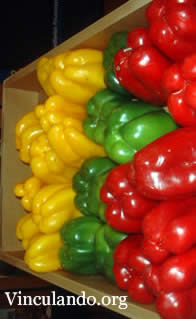Organic certification in Mexico
Several authors as shown, translated by Cecilia Avila
This article expresses the opinion of a diverse group of participants directly related to the topic ofproduction, certification and the commercialization of organic products in Mexico. Said opinions were expressed in the chronicle Red Morelos, by Areli Carreón.
Ecological Market "Ocelotl"
For us the Ecological Market "Ocelotl" of Xalapa, Veracruz which was started by Indigenous World A.C. and is backed by the University of Veracruz andthe municipality of Teocelo; official certification is something that we do not lose sleep over. Yes it interests us very much, we have profound convictions toward the health of the environment, natural food, the relationship between the two, no exportation, conscience consuming and bioregionalism, as a defense against political economic globalization.That’s why we promote certification among our neighbours, appointed by our own technical board, which integrates a team of sentient professionalfarmers that identify with the possibilities of organic management and sustainability. Since our project is not centered in exportation but in recouping traditional values rooted in the earth, we think that all the discussion and actions around the importance of certification raises from international control whose purpose is foreign to our philosophy and reality.

However some of our merchants have international certification, which pleases us, it makes no difference to them that the majority of the producers of "Ocelotl" are not certified and does not diminish the same basic convictions which guides us.
On behalf of all of us I appreciate the opportunity to participate in this forum of discussion about the importance or not, of certification, sending you all a warm hug.
Cambios
We here at CAMBIOS believe that organic certification is a transnational business. For us certification is a type of “dumping�?. To convince us of this we need only to ask a few questions: Who certifies? Why certify? Who benefits from certification? And remember, to start with, a sustainable organic product should not leave its bioregion or zone, it should be consumed locally. Why send to others our best food? Only for money? To do what with money? Wouldn’t it been better to consume our own goods? Finally if people want to consume organic products (NOT CERTIFIED) we need to commercialize them ourselves, among ourselves and not waste our time and money with foreign certification like IFOAM and the like.
This is at the foundation of our position. We are open to exploring how to support one another, producer and marketers.
Sincerely,
Eugenio Cabrera
CAMBIOS
Casfa, A.C.
In regards to organic certification may I be permitted a brief comment.
1.Agreed, we should eat our organic food.
2.But additionally there is the challenge of commercializing the excess. We the agriculturalists are the ones who feed the world, it’s important to provide quality food from our table to our neighbours, in our region, with other regions and with other countries. With reliable confidence there is no need for supervision. Internally or externally.
3.International certifiers have an important role. If there is a client that pays 10% more than what the conventional market pays with a 2% increases in investment, that is good business. Ultimately the markets have confidence in certifying agencies. Who ever thinks that certification is dumping should evaluate whether to pay for it or not, whether to do business or not.
4. In fact having serious external inspectors come (be it from another country or another organization that is related to organic agriculture) is very healthy. It helps to discipline the producers and makes us conscience of our comment to reliable consumers.
5.An organic certifier or any other, ultimately is a certifier and is part of a global movement that guarantees the existence of the human RACE on this planet in the face of growing risks of destruction. We must unify despite our differences. Thank you for allowing us to join in the in debate.
Cordially,
José Caballero Cervantes
Geneses, Integrated Agriculture.
Project Geneses, Integrated Agriculture Project, continuing with the topic of organic certification/production, it appears that all the comments come to TRUST, a value which appears that we have been losing at a rapid pace. If we had it among producers and consumers, certification would not be necessary, my word would suffice, but every time I try to sell my product, of excellent organic quality, everyone asks me: who guarantees that it’s the truth?
It’s been my personal experience that even with certifications and laboratory analysis, it’s hard to sell, even among producers, for two reasons : we don’t have trust among ourselves and more importantly, we don’t have anything to compare with. We lack TRUST AND PURCHASEABILITY, maybe along with rescuing our ecosystem we should also rescue trust and begin to work towards exchanging products, service and experiences.
Greeting to all,
Marquesa Morales.
Datos para citar este artículo:
Manuel A. Gómez Cruz. (2006). Organic certification in Mexico: some perspectives. Revista Vinculando, 4(2). https://vinculando.org/en/certification_mexico.html
gail Flyckt dice
Quisiera ver si me pudiesen guiar con respecto a certificaciones organicas; se puede certificar agua de manantial?
Gracias!
Sra. Gail Flyckt
Vinculando.org dice
Saludos Gail: existen muchos tipos de certificaciones, pero en esencia todas ellas son elementos que añaden valor a cualquier producto que te interese comercializar. Sin embargo, esas certificaciones sólo añaden valor a los ojos de los consumidores que saben lo que significa. En ese sentido, te sugerimos acercarte con alguna certificadora que sea razonablemente conocida en tu mercado meta, pues ello te dará los mejores resultados. Saludos y buena suerte.